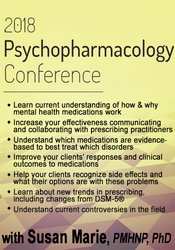
- Stories
- Magazine
- CE Training
- Symposium
- More
Get immediate lifetime access to this content by purchasing the digital seminar/online course instead that you can access using a variety of devices, and one CE certificate is included with purchase! Click the “Digital Seminar” or "Online Course" link below to learn more!
DVD Purchasers please note: In order to view the content, you will be required to have a DVD player or a DVD drive on your computer. Your CE is a separate fee.

Spend twelve action-packed hours learning about the newest advances in psychopharmacology and contemporary trends in medication management. From her unique perspective as a doctored psychiatric nurse practitioner, Susan Marie teaches psychopharmacology thoughtfully, with an emphasis on the experience of the client. Susan’s extensive 30 years of experience in mental health and passion for clients, shines through in the detail and thoroughness of her presentation.
Clients often only have a few minutes with their prescriber and require additional support. It’s vital that you are able to answer their questions, help manage side effects and understand reactions. Designed for counselors, nurses, psychotherapists, psychologists, and other mental health professionals, Susan provides the information you need in order to best help your clients.
This conference allows time for exploration of underrepresented areas, including ADHD, sleep, eating, and substance use disorders. Take home specialized guidelines for geriatrics, pregnant or nursing women, and clients with chronic pain. Discuss how the DSM-5® has impacted prescribing patterns and the use of psychotropics in newly defined diagnoses. In addition to a general ‘nuts and bolts’ review of medications, you will examine case examples, discuss medication controversies and how to effectively collaborate with prescribing practitioners.
Susan’s engaging presentation includes many take home “pearls” you can use to teach your clients about their medications and how to protect them from concerning, dangerous or adverse effects. You will find this conference to have the most up to date medication information and how to use it most effectively with your client.
| File type | File name | Number of pages | |
|---|---|---|---|
| Manual 046515 (11.21 MB) | 140 Pages | Available after Purchase | |
| CE Test – 046515 – Paper Option (273.4 KB) | Available after Purchase |

Susan Marie, PhD, PMHNP, CARN-AP, a licensed psychiatric nurse practitioner with full independent prescriptive practice and certification in addictions, brings to you over 30 years of clinical experience with highly vulnerable clients with suicidality, co-occurring addiction, homelessness, serious mental illnesses, traumatic brain injuries, and persistent pain conditions. She is noted for her “pearls and pitfalls” of psychopharmacology. Her passions are radical respect for people with serious mental illnesses & addictions, excellence in psychopharmacology, and integrating psychotherapeutic interventions for clients with PTSD, addictions and chronic pain.
Dr. Marie is Senior Clinical Director for Behavioral Health at Old Town Clinic, Central City Concern and Associate Professor at Oregon Health and Science University in Portland, Oregon. She teaches nationally on psychopharmacology as well as suicide assessment and intervention.
Speaker Disclosures:
Financial: Susan Marie is an Associate Professor for Oregon Health & Science University. She receives a speaking honorarium from PESI, Inc. She has no relevant financial relationships with ineligible organizations.
Non-financial: Susan Marie has no relevant non-financial relationship to disclose.
Access never expires for this product.
| 5 |
|
| 4 |
|
| 3 |
|
| 2 |
|
| 1 |
|
Satisfaction Guarantee
Your satisfaction is our goal and our guarantee. Concerns should be addressed to: PO Box 1000, Eau Claire, WI 54702-1000 or call 1-800-844-8260.
ADA Needs
We would be happy to accommodate your ADA needs; please call our Customer Service Department for more information at 1-800-844-8260.
Please wait ...